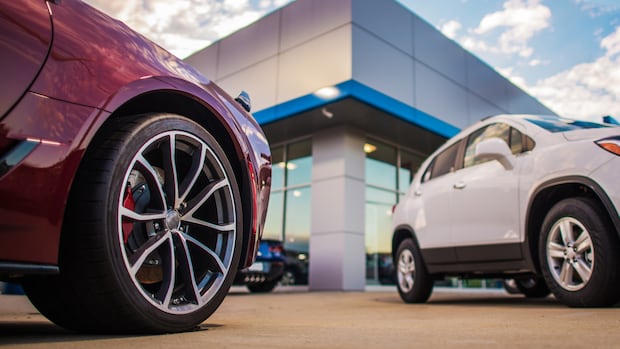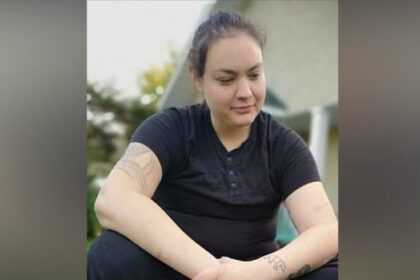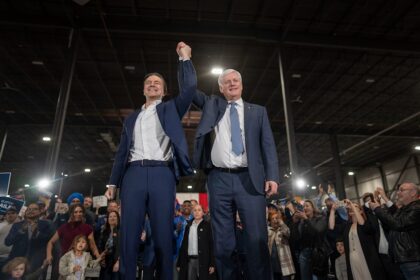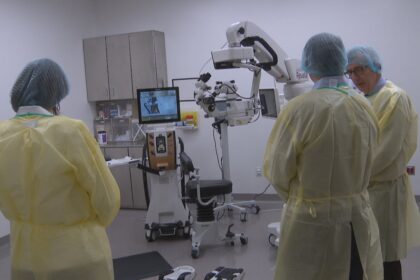We’ve all seen advertisements from car dealerships offering a deal on a specific make and model of new vehicle.But a hidden camera investigation by CBC’s Marketplace has revealed that some Ontario dealerships are adding costs to the advertised price when car buyers inquire about the vehicles in person.The province’s car sales regulator, the Ontario Motor Vehicle Industry Council (OMVIC), says the advertised price in a dealership ad must include all fees the consumer is expected to pay, except HST and licensing. In fact, it’s been Ontario law since 2010 that dealership ads must set out the total amount.Marketplace journalists went undercover posing as shoppers across the Greater Toronto Area to find out if they could get a car at the price advertised on the dealerships’ websites. Marketplace has received complaints from viewers who said they were being charged for add-ons like floor mats, rust protection and warranties.Marketplace co-host Charlsie Agro, middle, looks at car advertisements with CBC’s Sneha Agrawal, left, and Bobby Hristova for the show’s hidden camera visits to dealerships. (Steph Kampf/CBC)The team tried to get a quote on a new vehicle based on advertisements from 15 dealerships, which included some of Canada’s biggest brands: Chevrolet, Ford, Honda, Hyundai and Toyota.The investigation found six of the 15 dealerships charged more than the advertised price. Four of 15 dealerships showed a photo of a more expensive version of the vehicle in the ad than the one they were actually selling. And six of 15 included extra features the undercover shoppers didn’t ask for — though most of the extras were built into the advertised price and some dealerships agreed to remove them when we asked.George Iny, director of the Automobile Protection Association, a consumer advocacy group, says that “cheating has become more sophisticated” in the average consumer’s car-shopping experience.“Low-ball pricing has not disappeared,” he said. “They can’t seem to write an honest car ad that includes all the information you’ll need.”The secret shopping comes as the number of new car purchases has gone up since the COVID-19 pandemic, which led to vehicle and parts shortages that have decreased but are still being felt.Trying to get the advertised priceMarketplace ran into several issues while trying to get the advertised price.For example, when Marketplace visited Honda Queensway in Etobicoke, a sales rep offered a lower price for a 2026 Honda Civic LX than what was advertised. But he said that if the price went up when the car arrived, the customer would have to pay the difference.In a statement to Marketplace, the dealership said there may have been miscommunication over “a standard clause in many contracts related to factory-ordered vehicles,” and that they do have price protection when customers sign a contract.When Marketplace inquired about the price of a 2025 Tucson at 401 Dixie Hyundai in Mississauga, a salesperson said only military members or people who have previously bought a car at the dealership are eligible for the advertised price. The ad did not include that information.An advertisement from Dixie Ford’s website shows a 2025 Ford F-150 STX Supercrew 4×4 with a $999 down payment. The fine print notes that the down payment is in addition to freight and air tax. (dixieford.com)At Dixie Ford, a salesperson explained how an advertised $999 down payment on a 2025 Ford F-150 STX actually works out to be $3,694 after reviewing the fine print in the ad, including a freight charge of $2,595 and an “air tax” of $100.The fine print noted “freight and air tax” are part of the down payment, but didn’t mention the amounts.“This is ridiculous, man,” the salesperson said of the ad during Marketplace’s visit. “I complain about this. Because I can’t read [the fine print] … you can’t read this.”In an email to Marketplace, the dealership said it will “ensure clarity going forward” and “if any part of the advertisement or process caused confusion, that is not in keeping with our standards.” It added that third-party advertising templates sometimes limit the amount of detail that can be displayed in ads.WATCH | Salesperson explains how much a $998 down payment really costs:Salesperson explains how much a $998 down payment really costs At Formula Ford, a sales rep explained how the advertised $998 down payment was actually more than $4,000 when factoring in other charges, including some listed in the fine print.At Formula Ford in Pickering, a sales rep explained how the advertised $998 down payment was actually more than $4,000 when factoring in other charges, including some listed in the fine print. “They tell you not to tell people that when they come in [to the dealership], but that’s what it is,” the sales rep said during Marketplace’s visit.The salesperson also said Ford only allows bi-weekly payments, despite the advertisement quoting a weekly payment. The quote given for the bi-weekly payment was more than $200 over the advertised weekly payment over the course of the term.Management at Formula Ford disputed Marketplace’s findings, saying it is “committed to provide the clear advertisement as per OMVIC guidelines.” They said that weekly payments can be made directly to Ford, insisted they are transparent with consumers and that they never told staff to hide anything, “as this is not the business practice we encourage or demand from the staff.”Maureen Harquail, chief executive officer of OMVIC, said if an advertisement is not clear or shoppers aren’t getting an all-in price, they should walk away and contact her office. Vehicles pictured in ads more expensive than ones for saleOMVIC’s rules state that if a vehicle is pictured in an ad, the image must be of a model with the features and version available at the advertised price, or if the image is of a higher-priced trim level or colour, the ad must clearly and prominently include an explanation of the trim level or colour of the vehicle pictured, and the all-in price for that model.But ads from 401 Dixie Hyundai, Queensway Hyundai and Agincourt Hyundai showed the “ultimate” version of a 2025 Hyundai Tucson, even though the pricing was for the “preferred” version, which is the vehicle’s base model.The ultimate version is a plug-in hybrid vehicle that’s more expensive than the preferred version and also has more colour options, according to Hyundai’s website.During Marketplace’s secret shopping, the sales reps at all three dealerships noted the ads showed a different version of the vehicle.An advertisement from 401 Dixie’s website shows the ultimate version of the 2025 Tucson in Amazon grey, despite showing the pricing for the preferred version, which is the base model. (401dixiehyundai.com)Fine print on the ad on 401 Dixie Hyundai’s website stated, “Vehicles may not be exactly as shown (and/or) Vehicles are for illustrative purposes only.”Iny called the fine print “a joke,” saying dealerships need to “show the right photo and do the job properly.”“You’re passing off a different car as the one in the promotion,” he said. “That’s, in our mind, a deception.”In a statement about Marketplace’s visits to three of its dealerships, Hyundai Auto Canada said it is “committed to upholding the highest standards across our network and expect all dealerships to operate in full compliance with consumer protection and advertising laws.” The company added it was confident that its dealers share this commitment, and is conducting a “thorough review” of the dealerships involved.WATCH | Salesperson says dealership ad ‘extremely misleading’:Salesperson says dealership ad ‘extremely misleading’At Brimell Toyota in Scarborough, an ad for the SR version of the 2025 Tundra CrewMax had a picture of the SR5 version, which was at least $1,656 more expensive.At Brimell Toyota in Scarborough, an ad for the SR version of the 2025 Tundra CrewMax had a picture of the SR5 version, which was at least $1,656 more expensive.The Toyota sales rep realized the discrepancy during the Marketplace visit and called it “extremely misleading.” The rep tried to make up for the wrong photo in the ad by offering the secret shoppers an even more expensive version of the truck for the advertised price.Brimell Toyota said in a statement it “consistently adheres to all government rules and regulations” and that the dealership “acted with integrity and openness in every aspect of your dealings.”Extra features added to priceWhen a dealership adds extra features onto a vehicle for sale, it’s called “tied selling.” In Ontario, that’s legal so long as the extras are included in the advertised all-in price. The rules also say anything optional must be presented as such.Common add-ons can include features like wheel locks and anti-theft features.WATCH | Sales rep says $595 theft deterrent is ‘mandatory’ in Toronto:Sales rep says $595 theft deterrent is ‘mandatory’ in Toronto At Queensway Hyundai, a salesperson told journalists each vehicle has a $595 theft deterrent.At Queensway Hyundai, the salesperson told journalists each car comes with a $595 theft deterrent. The sales rep said it was “mandatory” to have it in Toronto.When journalists asked to remove the theft deterrent, the salesperson said they would still be charged a similar amount, calling it a “dealer admin fee.”Saira Virani, a spokesperson for the City of Toronto, told Marketplace in an email there is “no bylaw under the City’s Municipal Licensing & Standards division that requires a theft deterrent on cars.”Iny advises consumers to be aware of what products may be offered at a dealership or added on to their vehicle. “If you weren’t interested in it to start with, don’t buy it,” he said. “If you are interested in it, you might want to price it at an after-market shop that sells the same thing, and see how they compare.”Calls for a cooling-off period Harquail said OMVIC does its own mystery shopping, seeking out non-compliant advertising and unregistered salespeople. It found that 72 per cent of dealers passed in 2024 and that compliance has increased three years in a row. “For the most part, dealers are doing a great job,” but she also said Marketplace’s results are “concerning.” “We want consumers to know exactly what they’re going into,” she said. “It’s a big deal to buy a car. For some people, it’s one of the biggest purchases they’ll ever make.”Harquail said OMVIC prioritizes educating dealerships, believing it’s the best approach to enforcement, but is able to use “the nuclear method” if there is egregious conduct. That could mean suspending or revoking a dealership’s licence to sell cars — although it would be subject to a legal process.Maureen Harquail is OMVIC’s chief executive officer and says her organization supports a cooling-off period for car buyers. (Steph Kampf/CBC)Right now, unless there’s a clause in your contract or the dealer breached the Motor Vehicles Dealers Act, the sale is final as soon as you sign the bill of sale, according to OMVIC.Harquail, Iny and other consumer advocates would like to see car buyers in Ontario have a 24- to 48-hour cooling-off period giving them the chance to cancel a car purchase before they’ve picked up the vehicle. Ontario already has a cooling-off period for gym memberships and condominium purchases.In Quebec, shoppers financing a vehicle through a dealership have a 48-hour cooling-off period if they haven’t taken possession of the car. In British Columbia, those leasing a vehicle have a one-day cooling-off period.In 2024, the Ontario government explored implementing a two-day cooling-off period, but scrapped the idea. In a statement posted to social media that year, Todd McCarthy, the minister of Public and Business Service Delivery at the time, said it would “create unnecessary red tape that would have negative consequences for the industry and the overall purchase experience for consumers.”When Marketplace recently asked Ontario Premier Doug Ford about this, he said he’d “speak to the minister.” He also offered a message for consumers:“Be cautious, do not pay more than what they’ve advertised, simple as that.”
Friday, 6 Feb 2026
Canada – The Illusion
Search
Have an existing account?
Sign In
© 2022 Foxiz News Network. Ruby Design Company. All Rights Reserved.
You May also Like
- More News:
- history
- Standing Bear Network
- John Gonzalez
- ᐊᔭᐦᑊ ayahp — It happened
- Creation
- Beneath the Water
- Olympic gold medal
- Jim Thorpe
- type O blood
- the bringer of life
- Raven
- Wás’agi
- NoiseCat
- 'Sugarcane'
- The rivers still sing
- ᑲᓂᐸᐏᐟ ᒪᐢᑿ
- ᐅᑳᐤ okâw — We remember
- ᐊᓂᓈᐯᐃᐧᐣ aninâpêwin — Truth
- This is what it means to be human.
- Nokoma











